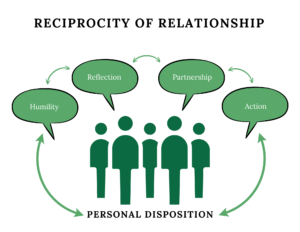Relationship: Supporting Indigenous Student Success
Higher education has a responsibility to address the lived reality for Indigenous learners. Educators can look to build authentic relationships with learners and manage learning outcomes.
By Gwenna Moss Centre for Teaching and Learning
The current reality faced by Indigenous students is the focus of discussion from pre-kindergarten to post-secondary. Across the country, education for First Nation, Inuit, and Métis people is a different experience. Numerous factors contribute to this reality, many of which are within the control of education authorities and classroom personnel. The call to address systemic inequities has been the focus of education since the early 2000s. While systemic change can often take additional time, personal adaptations can begin when you are ready. Growing authentic, trusting relationships between educator and learner will improve student experience.
Educators can use the Reciprocity of the Relationship model to support the Indigenous student experience. The model describes the critical, fundamental understanding of the educator mindset needed for the respectful approach to improving educator-learner relationship, engagement and, in the end, achievement. Educators are responsible for teaching all learners about the history of the Métis and First Nations people on this land called Saskatchewan. They will adapt to the curriculum, build partnerships, engage in shared decision-making, and ensure learners achieve learning outcomes. Approaching education with a mindset that promotes learning about this land's shared history builds understanding for all learners. This knowledge will help reduce misconceptions that contribute to racial ideals. When working together, we can foster trust and improve relationships essential to citizenship education. When humility, reflection, partnership, and action act in unison, they nurture an inherent tendency to see, feel, think, and act in ways that nourish reconciliation.
Examining personal disposition is the starting point for engaging in respectful relationships. Understanding the reality experienced by Métis, First Nation, and Inuit learners, community, and staff is essential for knowing, valuing and believing in learners. This knowledge will help reduce misconceptions that contribute to racial ideals. When educators and learners work together, we can foster trust and improve relationships essential to citizenship education.
The Reciprocity of Relationship model requires an understanding of the Indigenous diversity present in the classroom, University and community. A humble approach to education will involve the educator seeking ways to honour prior knowledge, protecting space for the voice, and valuing participants through flattened hierarchies. The humbled educator accepts personal faults and is aware of personal biases that impact instruction, assessment and expectations. A humble approach to education will help educators recognize how bias impacts instruction, evaluation, and expectations. An end goal for a humble educator is to understand the educator can become a learner, and the learner can become the educator.
Consider these questions when examining humility:
- How can I elevate First Nation, Inuit and Métis knowledge to levels equivalent to Western knowledge?
- How can I support unlearning and relearning narratives to enhance Métis, First Nation and Inuit pedagogy?
- How do I examine personal beliefs to reduce the impact of bias on instruction, assessment and expectations?
The Reciprocity of Relationship model requires educators to reflect on their purpose in the classroom, university and community in relationship to First Nation, Inuit and Métis pedagogy. A reflective approach to learning will involve the educator recognizing unconscious bias and social positioning. The reflective educator consciously seeks to identify how lived experiences have influenced personal worldview and recognize the impact on learners. The reflective educator will question personal and systemic biases and assumptions.
Consider these questions when examining reflection:
- How do I foster safe spaces (physical, emotional, intellectual & spiritual) to ensure mutual learning and building of trust?
- How do I affirm Métis, First Nations, and Inuit relationships in all aspects of education?
The Reciprocity of Relationship model requires working in tandem with learners and community. A partnership approach to education requires respecting multiple worldviews that will foster understanding of the value of shared responsibility. A relational educator takes a humble approach to engaging in partnership, recognizing formal and informal positions of power can be influenced by the dominant culture. Understanding and exploring the Treaty relationship invites educators to reflect on personal and professional responsibilities to (re)conciliation and as stewards of the land. The result of a purposeful educational partnership is improved outcomes for Indigenous learners.
Consider these questions when examining partnership:
- How can I honour connections to the natural realm to motivate learner engagement, achievement and success?
- How can I affirm individual identity and community perspectives to co-construct instruction, assessment?
- How will I seek and foster caring relationships towards an increased sense of empowerment for learners?
The Reciprocity of Relationship model requires the educator to respond to the inequities in their classroom, at the University, and in the community. An action-oriented approach to education will involve taking concrete steps to obtain equitable outcomes for all learners with a focus on the success of First Nations, Métis, and Inuit learners. The proactive educator takes responsibility to influence change for and with people in all parts of their lives including the classroom. The proactive educator makes the conscientious choice to overtly affirm Indigenous culture and to deconstruct and adjust practices that are limited to Western ways of knowing, being and doing.
Consider these questions when examining action:
- How will I utilize or apply a variety of evidence-based teaching practices that honour individual learners and Indigenous cultures?
- How will I prioritize implementing professional learning that will lead to improved Indigenous learner success?
- How will I support healing through the development of learner confidence and pride in self?
Title Photo credit: USask Flickr

